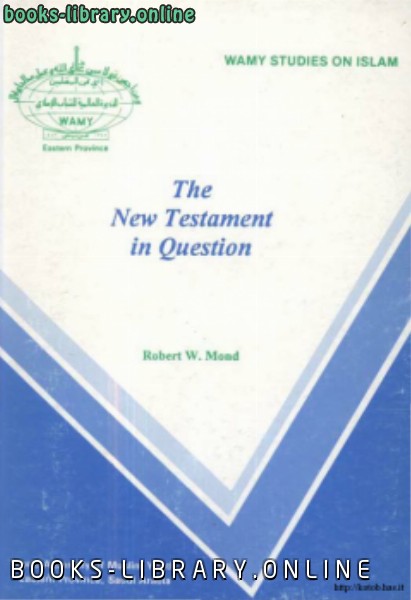📘 قراءة كتاب The New Testament in Question أونلاين


Introduction 1
1 The Early Books Written about Jesus 3
The Other Books 3
The New Testament Documents 6
2 Palestine at the Time of Jesus 13
3 The Rightful King 17
The Privileged Background 20
Public Recognition 21
4 The Secret the Church Forbade 23
5 The Council of Jerusalem 29
The Acts of the Apostles 30
6 He is a Prophet 38
The "Sons" of God 40
7 The Meaning of Islam 44
Notes and References 47
Bibliography 50
People have argued, have killed each other, have waged wars throughout
the course of the last two thousand years over the way in which particular
passages of the New Testament should be understood. In the past, when
Church Fathers or other individuals were confronted with one of the various
biblical ambiguities and contradictions, they speculated about its meaning.
They attempted to interpret it. Once accepted, the conclusion of their
speculation - that is, their interpretation - would become enshrined as
dogma. Over the centuries, it then came to be regarded as established fact.
Such conclusions are not fact at all. On the contrary, they are speculation
and interpretation made into a tradition; and it is this tradition which is
constantly mistaken for fact.
We basically know what views are held by the major branches of
Christianity, but how did they arrive at those doctrines? To completely
understand Christianity and the Jesus of history, it is essential to examine
all possible aspects. It is important not only to know what is taught by the
Church, but also what is ignored, and to know why it is ignored. The
Gospels give us an idea of who Jesus was, but the Gospels are documents of
a stark, mythic simplicity. They describe a world stripped to certain bare
essentials, a world of a timeless, almost fairy-tale character. The effect is
like reading a biography of, say, Billy Graham which makes no mention of
his friendships with presidents and other prominent individuals, no mention
of Kennedy's assassination, no mention of the civil rights movement, the
war in Vietnam, the transformation of values during the 1960's, or
Watergate and its aftermath.
Contrary to Christian tradition, Palestine, at the time of the Christian
era, was not a fairy-tale kingdom. It was a real place, with real individuals,
such as one might find anywhere else in the world at any other time in
history. Herod was not a king of obscure legend. He was a very powerful
ruler, whose reign (37 to 4 B.C.) extends beyond its biblical context to
overlap those of well known secular figures - of Julius Caesar, for instance,
Cleopatra, Mark Antony, Augustus and other personages familiar to us
from school books and even from Shakespeare. Palestine in the first
century, like any other place in the world, was subject to a complex array of
social, psychological, political, economic, cultural, and religious factors.
Numerous factions quarreled with each other and among themselves.
Various parties had conflicting goals but often made temporary alliances
with each other for the sole purpose of expediency. Deals were secretly
arranged. The people, like people anYwhere else at any other time, veered
between apathetic torpor and hysterical fanaticism, between abject fear and
fervent conviction. Little, if any, of this is conveyed by the Gospels - only a
residue of confusion. And yet these currents, these forces, are essential for
any understanding of the historical Jesus - the Jesus who actually walked
the soil of Palestine two thousand years ago - rather than the Christ of faith.
It is this Jesus that we endeavor to understand more clearly. To make such
an endeavor is not to declare oneself anti-Christian.
A study of early church history and alternative interpretations of the
New Testament puts the role of Jesus in a different light. If the Jesus of
history is different than the Christ of faith, then many new questions come
to mind: What was his real purpose? What about the virgin birth? What
about the miracles he preformed? The latter part of this book answers these
questions from an Islamic perspective. Many people have heard something
about Islam, but to state definitively what it is often proves difficult. It is
believed by Muslims that the Torah, the Gospel, and the Quran were all
originally revealed by the same God. And it is on this basis, the belief in
one God, and a shared history, that we hope to achieve a greater
understanding of the three most famous religions of the world.
book, in pdf format, by Robert Maude, one of the most important works on the New Testament. The author addressed a number of important questions and responded to them.
The book begins by talking about the first books that talked about Christ, then the modern books, the New Testament, how Christ compared to the Old Testament, and then tells us about Palestine in the era of Christ.
He talks about the secrets that the Church and the Council of Jerusalem forbade, and also deals with the question that Christ is the Son of God. The book concludes by talking about the meaning of Islam, هذه العقائ
حجم الكتاب عند التحميل : 1.9 ميجا بايت .
نوع الكتاب : pdf.
عداد القراءة:
اذا اعجبك الكتاب فضلاً اضغط على أعجبني و يمكنك تحميله من هنا:

شكرًا لمساهمتكم
شكراً لمساهمتكم معنا في الإرتقاء بمستوى المكتبة ، يمكنكم االتبليغ عن اخطاء او سوء اختيار للكتب وتصنيفها ومحتواها ، أو كتاب يُمنع نشره ، او محمي بحقوق طبع ونشر ، فضلاً قم بالتبليغ عن الكتاب المُخالف:
 قبل تحميل الكتاب ..
قبل تحميل الكتاب ..
يجب ان يتوفر لديكم برنامج تشغيل وقراءة ملفات pdf
يمكن تحميلة من هنا 'http://get.adobe.com/reader/'


 منصّة المكتبة
منصّة المكتبة 